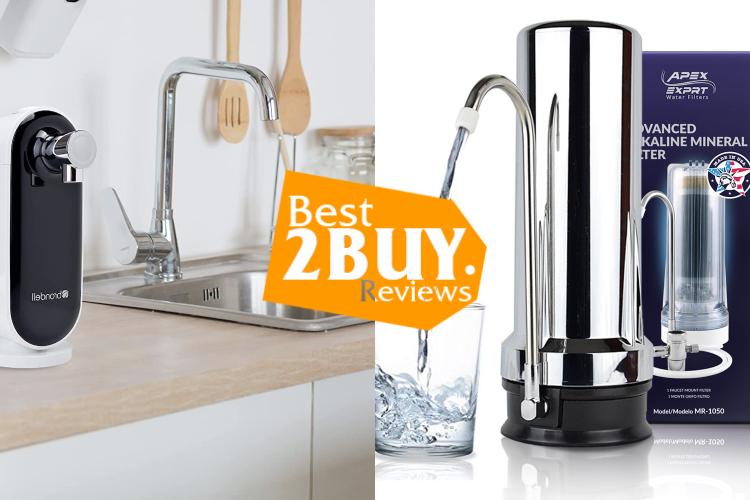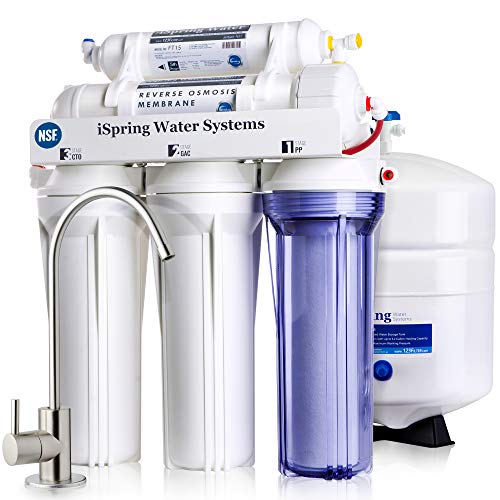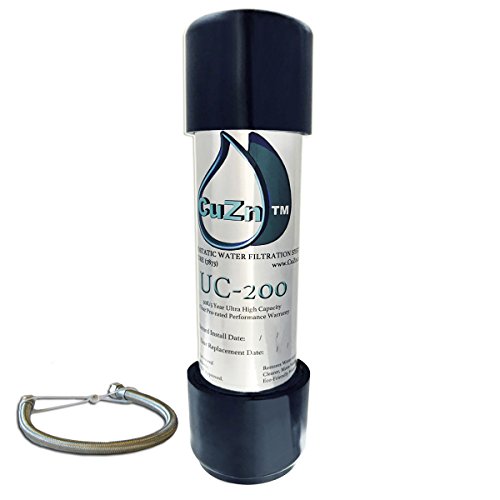Countertop Water Filters: A Convenient Solution for Clean and Healthy Water

- 1. Countertop Water Filters: A Convenient Solution for Clean and Healthy Water
- 1.1. What are Countertop Water Filters?
- 1.2. Types Of Countertop Water Filters
- 1.2.1. Carbon Cartridges
- 1.2.2. Ceramic Cartridges
- 1.2.3. Aragon Cartridges
- 1.2.4. Reverse Osmosis
- 1.3. How Do Countertop Water Filters Work?
- 1.4. Do Countertop Water Filters Really Work?
- 1.5. Advantages and Drawbacks of Countertop Water Filters
- 2. Choosing the Right Countertop Water Filter
- 2.1. Assess Your Water Quality
- 2.2. Filtration Technology
- 2.3. Filter Capacity and Lifespan
- 2.4. Certification and Testing
- 2.5. Design and Space
- 2.6. Maintenance and Installation
- 2.7. Cost
Clean water is a fundamental necessity for all living organisms on Earth. It comes as no surprise that ensuring access to the purest drinking water possible is a top priority for everyone. Fortunately, there exists a multitude of methods to achieve this goal. In fact, the abundance of options for purifying tap water can sometimes be bewildering. Should you opt for bottled water, or should you invest in a comprehensive whole-house filtration system?
One increasingly popular choice in recent times is the countertop water filter. However, the question arises: which countertop water filter should you select? What criteria should you consider when shopping for one? And, most importantly, are these filters suitable for your specific needs? In this article, we will provide you with the necessary information to determine whether countertop water filters represent the ideal solution for your home.
What are Countertop Water Filters?
Countertop water filtration systems are small, space-efficient tools created for the direct purification of tap water right where it's needed. Positioned usually on the kitchen countertop, they establish a connection with the faucet via a diverter valve or hose. Employing diverse filtration techniques, these systems effectively eliminate contaminants like sediment, chlorine, heavy metals, pesticides, and bacteria, ensuring the availability of clean, delicious water for both drinking and cooking purposes.
Types Of Countertop Water Filters
Carbon Cartridges
Opting for Carbon Benchtop Water Filter cartridges is a wise choice if your primary goal is to eliminate odors and enhance the taste of your water by removing Chlorine. Activated carbon in these cartridges captures contaminants on its surface rather than physically absorbing them. Activated carbon is highly efficient as a water filter, as it eliminates toxins from the water while preserving essential salts and minerals.
Ceramic Cartridges
Ceramic Benchtop Water Filter cartridges are ideal for eradicating bacteria and cysts. These cartridges employ mechanical filtration by utilizing countless minuscule ceramic pores to sift out silt, sand, dirt, sediment, and bacteria.
Aragon Cartridges
The creators of Aragon harnessed synthesized polymer materials following the tragic Chernobyl nuclear accident for the purpose of purifying radioactive water. Through further research in synthesis, they developed a novel material called Aragon. Aragon effectively removes scale, viruses, bacteria, and heavy metals from water. Aragon cartridges employ a combination of mechanical adsorption and ion exchange methods to treat the water.
Reverse Osmosis
In urban settings, a Reverse Osmosis system stands out as one of the most advanced filtration methods available. However, it comes with the drawback of substantial water wastage, as the RO system divides the water and disposes of 50% of it along with the contaminants down the drain.
How Do Countertop Water Filters Work?
To determine whether countertop water filters are the suitable solution for addressing your water quality concerns, it is crucial to understand their operational mechanisms.
While countertop filters share similarities with faucet filters, countertop models distinguish themselves by featuring a larger filter component positioned adjacent to the sink. These systems are connected to your faucet via a diverter tube, which directs tap water towards the filter. Within this setup, water undergoes filtration by passing through filter cartridges designed to address various common water quality issues, including:
- Unpleasant tastes
- Odors
- Chlorine
- Fluoride
- Sediment
After the water has been effectively filtered, it emerges from the integrated faucet of the system, rendering it ready for use.
Do Countertop Water Filters Really Work?
In a scenario where your water quality concerns are limited to the most basic issues and you have just one sink, a countertop water filter could be a viable option. Nevertheless, such circumstances are seldom encountered.
Although countertop filters can suffice for simple requirements, they prove inadequate for thorough water purification and fall short of filtering all your water sources. For instance, while a countertop filter might eliminate chlorine odors from your drinking water, your showers would continue to emanate a swimming pool-like scent.
Advantages and Drawbacks of Countertop Water Filters
Before arriving at a final verdict regarding countertop water filters, it's important to weigh the pros and cons associated with these filtration systems.
Advantages of Countertop Water Filters:
- Improved Water Quality: One of the primary benefits of countertop water filters is their ability to enhance the quality of tap water. These filters effectively remove contaminants that may be present in the water supply, ensuring that you and your family are not exposed to harmful substances. By eliminating chlorine, lead, and other impurities, countertop filters provide water that is not only safer but also tastes better.
- Compact Size: Countertop filters boast a compact design in comparison to some alternative water filtration methods.
- User-Friendly: They are straightforward to install and exceedingly convenient to operate, making them a top choice for those seeking simplicity.
- Cost-Effective: Countertop filters come in a wide price range, typically starting at around $40 and going up to over $450, contingent on the specific system and the number of filtration stages it incorporates.
Drawbacks of Countertop Water Filters:
- Limited Functionality: While countertop filters may offer more comprehensive filtration than certain alternatives like shower filters (which primarily target chlorine), they often fall short when dealing with complex water quality issues such as lead, arsenic, or mercury.
- Frequent Filter Replacement: The maintenance of countertop filtration systems varies, but some require filter replacements as frequently as every six months.
Choosing the Right Countertop Water Filter
Selecting the right countertop water filter to meet your requirements is paramount, given the multitude of choices available. In this article, we will walk you through the essential factors to weigh when making this significant decision.
Assess Your Water Quality
Prior to choosing a countertop water filter, it's imperative to comprehend the quality of your tap water. You can procure a water quality report from your local water utility or employ a home water testing kit. This step will empower you to identify the precise contaminants existing in your water, such as chlorine, lead, pesticides, or bacteria. Armed with this knowledge, you can then select a filter designed to effectively eliminate these specific contaminants.
Filtration Technology
Countertop water filters employ diverse filtration technologies to eliminate impurities. Common options include activated carbon filters, ceramic filters, reverse osmosis filters, and UV filters. Each technology boasts its unique advantages and limitations. When determining the filtration technology most suitable for your needs, consider both your specific requirements and the contaminants present in your water.
Filter Capacity and Lifespan
The capacity and lifespan of the filter are pivotal considerations. Capacity refers to the volume of water the filter can treat before necessitating replacement. Some filters come with a fixed capacity, while others offer replaceable cartridges. Additionally, assess the filter's lifespan, which denotes how long it can efficiently purify water before needing replacement. Align your choice with your household's water consumption, ensuring it can meet your needs without frequent replacements.
Certification and Testing
Seek out countertop water filters that bear certification from reputable organizations like NSF International or the Water Quality Association. These certifications guarantee that the filter has undergone independent testing and meets stringent standards for contaminant removal. Furthermore, peruse third-party testing results and customer reviews to gain further insights into the filter's performance and reliability.
Design and Space
Factor in the design and available space in your kitchen while making your selection. Countertop filters are available in various shapes and sizes, so opt for one that complements your kitchen decor and possesses a compact design suitable for your countertop area.
Maintenance and Installation
Contemplate the ease of maintenance and installation when picking a countertop water filter. Some filters necessitate professional installation, while others can be easily set up without any tools. Additionally, consider the maintenance requirements, including filter replacement frequency and cleaning procedures. Choose a filter that aligns with your lifestyle and is convenient to maintain.
Cost
Cost is an important factor to weigh when deciding on a countertop water filter. The price of such filters can fluctuate based on factors such as brand, features, filtration technology, and capacity. On average, countertop water filters can range from $50 to $200. It's essential to consider your individual needs and budget constraints when making your selection.
In conclusion, countertop water filters provide a convenient and efficient means to guarantee access to pure and wholesome drinking water. Thanks to their simple installation, cost-effectiveness, and capacity to eliminate various impurities, these filters present an outstanding choice for households and individuals who prioritize the purity of their tap water. By opting for a countertop water filter, you can relish the assurance that you're enjoying safe and delicious water every single day.











